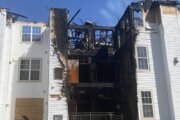ERIKA NIEDOWSKI
Associated Press
FALL RIVER, Mass. (AP) — Lawyers for ex-New England Patriot Aaron Hernandez continued their effort Wednesday to have cellphone evidence thrown out, and a judge began hearing testimony on what the defense claims was an unlawful interrogation of him at his home.
Judge E. Susan Garsh issued no immediate ruling after considering testimony over two days on whether the seizure of the ex-player’s BlackBerry was illegal.
The defense also maintains Hernandez was unlawfully questioned while state police executed search warrants at his North Attleborough house. In a prior affidavit, he said he felt “helpless in the face of the occupation of my house by the police.” He also said he worried “what would happen” to his fiancee and baby if he didn’t answer questions, though he had directed police the day before to speak to his lawyers.
Under questioning Wednesday in Fall River Superior Court, state police Sgt. Paul Baker said Hernandez did not appear frightened or raise any concerns about his family when authorities arrived with the warrants. He described the scene as “low key.”
Hernandez, 24, has pleaded not guilty to first-degree murder in the 2013 shooting death of Odin Lloyd, a Boston semi-professional football player who was dating the sister of Hernandez’s fiancee.
Bristol County prosecutors played video surveillance from Hernandez’s home that shows him go over to the living room couch and lie down shortly after authorities enter the residence. His fiancee, Shayanna Jenkins, can be seen reviewing the warrants. His baby is unaccompanied on the couch.
Hernandez can then be seen getting up, picking up his daughter and stretching out again on the couch, while appearing to look in the direction of the TV.
The defense has said Hernandez didn’t “feel free to leave,” but Baker testified he could have. Hernandez’s lawyers have also said troopers’ guns were visible, but Baker said nobody had their weapons out. One trooper’s holster was visible, he said.
Testimony is scheduled to continue Thursday.
The issue of the warrants’ execution is related to the seizure of Hernandez’s cellphone because the defense says authorities wouldn’t have known where the device was — Hernandez gave it to his attorneys — but for the allegedly unlawful questioning.
Assistant District Attorney Patrick Bomberg testified Tuesday that he learned Hernandez’s lawyers had the phone only when he called one of them, Michael Fee, to inform him the search was underway.
Fee testified Wednesday that Bomberg indicated he already knew. Fee acknowledged Hernandez’s BlackBerry was handed over to a Massachusetts state trooper in the lobby of his firm’s building in Boston without objection. But Fee said that was arranged because he believed, on Bomberg’s word, that there was a “valid warrant.”
Fee also testified he didn’t read the warrant himself until after the phone had been surrendered and said the colleague who reviewed it didn’t have extensive experience in criminal matters.
Charles Rankin, another of Hernandez’s attorneys, later told the judge that the issue of consent doesn’t matter because the warrant didn’t authorize the phone’s seizure from Hernandez’s lawyers or at the law office.
Prosecutor Roger Michel, meanwhile, accused the defense of having a “classic case of buyer’s remorse.” He suggested the legal team handed over the phone early in the murder investigation in hopes that being cooperative would bring some kind of benefit to their client, but that that “bet” didn’t pay off.
“At every step, what the police did was 100 percent authorized by the warrant or by law,” Michel said.
Copyright 2014 The Associated Press. All rights reserved. This material may not be published, broadcast, rewritten or redistributed.







